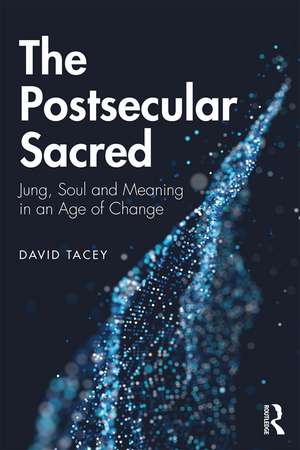The Postsecular Sacred: Jung, Soul and Meaning in an Age of Change
Autor David Taceyen Limba Engleză Paperback – 11 iul 2019
Beginning with Jung’s belief that the psyche has never been secular, Tacey examines the new desire for spiritual experience and presents a logic of the unconscious to explain it. Tacey argues that what has fuelled the postsecular momentum is the awareness that something is missing, and the idea that this could be buried in the unconscious is dawning on sociologists and philosophers. While the instinct to connect to something greater is returning, Tacey shows that this need not imply that we are regressing to superstitions that science has rejected. The book explores indigenous spirituality in the context of the need to reanimate the world, not by going back to the past but by being inspired by it. There are chapters on ecopsychology and quantum physics, and, using Australia as a case study, the book also examines the resistance of secular societies to becoming postsecular. Approaching postsecularism through a Jungian perspective, Tacey argues that we should understand God in a manner that accords with the time, not go back to archaic, rejected images of divinity. The sacred is returning in an age of terrorism, and this is not without significance in terms of the ‘explosive’ impact of spirituality in our time.
Innovative and relevant to the world we live in, this will be of great interest to academics and scholars of Jungian studies, anthropology, indigenous studies, philosophy, religious studies and sociology due to its transdisciplinary scope. It would also be a useful resource for analytical psychologists, Jungian analysts and psychotherapists.
| Toate formatele și edițiile | Preț | Express |
|---|---|---|
| Paperback (1) | 287.05 lei 3-5 săpt. | +16.20 lei 7-11 zile |
| Taylor & Francis – 11 iul 2019 | 287.05 lei 3-5 săpt. | +16.20 lei 7-11 zile |
| Hardback (1) | 1095.75 lei 6-8 săpt. | |
| Taylor & Francis – 9 iul 2019 | 1095.75 lei 6-8 săpt. |
Preț: 287.05 lei
Nou
Puncte Express: 431
Preț estimativ în valută:
54.93€ • 59.65$ • 46.14£
54.93€ • 59.65$ • 46.14£
Carte disponibilă
Livrare economică 01-15 aprilie
Livrare express 18-22 martie pentru 26.19 lei
Preluare comenzi: 021 569.72.76
Specificații
ISBN-13: 9780367203221
ISBN-10: 0367203227
Pagini: 206
Dimensiuni: 156 x 234 x 13 mm
Greutate: 0.29 kg
Ediția:1
Editura: Taylor & Francis
Colecția Routledge
Locul publicării:Oxford, United Kingdom
ISBN-10: 0367203227
Pagini: 206
Dimensiuni: 156 x 234 x 13 mm
Greutate: 0.29 kg
Ediția:1
Editura: Taylor & Francis
Colecția Routledge
Locul publicării:Oxford, United Kingdom
Public țintă
Postgraduate and ProfessionalCuprins
Introduction; The Postsecular Condition; Chapter 1: The Postsecular Landscape; Chapter 2: The Mystical Turn; Secularism Under Pressure; Chapter 3: A Secular Country; Chapter 4: The Aboriginal Gift We Will Not Accept; Reanimation of the World; Chapter 5: Ecopsychology and Indigenous Cosmology; Chapter 6: Physics and Reanimation; Postsecular Religion and Atheism; Chapter 7: God After God; Chapter 8: Derrida: Emissary of the Postsecular; Violence and the Sacred; Chapter 8: Return of the Sacred in an Age of Terror; Chapter 10: Epilogue: Sacrifice and the Future; Index
Notă biografică
David Tacey is Emeritus Professor of Humanities, La Trobe University, Australia. He is the author of many books, including The Darkening Spirit: Jung, Spirituality, Religion (Routledge).
Recenzii
"The issues with which this book deals have been attracting increased interest for several decades, and this seems set to continue for the foreseeable future. The question of the place of the sacred in predominantly secular cultures is unlikely to be resolved one way or the other anytime soon." – Roderick Main, University of Essex, UK; author, The Rupture of Time
Descriere
David Tacey presents a unique psychological study of the postsecular, adding a Jungian perspective to a debate shaped by sociology, philosophy and religious studies. He looks at the unexpected return of the sacred in Western societies, and how the sacred is changing our understanding of humanity and culture.
